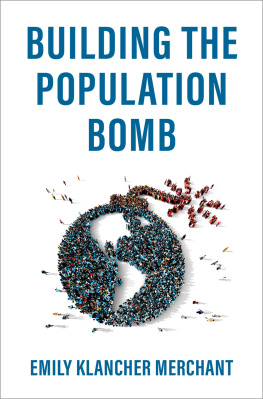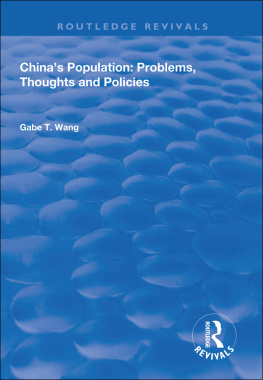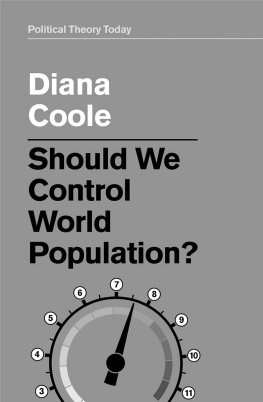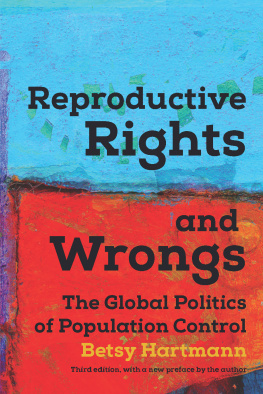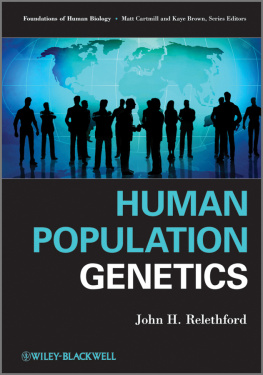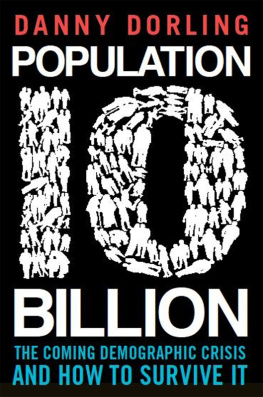Building the Population Bomb

Oxford University Press is a department of the University of Oxford. It furthers the Universitys objective of excellence in research, scholarship, and education by publishing worldwide. Oxford is a registered trade mark of Oxford University Press in the UK and certain other countries.
Published in the United States of America by Oxford University Press
198 Madison Avenue, New York, NY 10016, United States of America.
Oxford University Press 2021
All rights reserved. No part of this publication may be reproduced, stored in a retrieval system, or transmitted, in any form or by any means, without the prior permission in writing of Oxford University Press, or as expressly permitted by law, by license, or under terms agreed with the appropriate reproduction rights organization. Inquiries concerning reproduction outside the scope of the above should be sent to the Rights Department, Oxford University Press, at the address above.
You must not circulate this work in any other form and you must impose this same condition on any acquirer.
Library of Congress Control Number: 2021933733
ISBN 9780197558942
eISBN 9780197558966
DOI: 10.1093/oso/9780197558942.001.0001
For my family, planned and unplanned.
Contents
This book was a long time in the making, and I incurred many debts along the way. My earliest academic mentors, Gary Wilder, Pamela Smith, and Samuel Yamashita at Pomona College, sparked my fascination with historical research. At the University of Michigan, Sonya Rose, Kali Israel, Farina Mir, Nancy Hunt, and Gabrielle Hecht shepherded me through the early years of graduate school; Myron Gutmann and Barbara Anderson introduced me to demography and inspired me to pursue its history; John Carson, Howard Brick, and Paul Edwards saw me through the dissertation process and helped me land on the other end.
Thanks go to my family, who fed and housed me, held my hand, and even washed my hair when necessary: Karen Hilfman and Ken Levy; Jon Klancher and Joan Cucinotta; Nancy, Sophie, and Maya Klancher; Lesley, Richard, and Rebecca Hume; and Tania Verafield and Nadine Levyfield. Equally important are my Ann Arbor friends and colleagues, who celebrated my triumphs and helped me weather numerous defeats: Diana Mankowski, Laura Hilburn, LaKisha Simmons, Rebecca Grapevine, Crystal Chung, Lenny Urea Valerio, Yan Long, Susan Hwang, Ken Garner, Dan Hirschman, Jamie Budnick, Liz Ela, Emily Marshall, Kristen Cibelli, Birgit and Florian Keusch, Clay Howard, Tandiwe and Nicole Aebi-Moyo, Liz Harmon, Robyn DAvignon, Ashley Rockenbach, Paul Hbert, Ronit Stahl, Katie Rosenblatt, Laura Ferguson, David Merchant, Susan Leonard, Ken Sylvester, George Alter, Elizabeth Moss, Elizabeth Sikkenga, Mary Vardigan, and Sanda Ionescu.
At Dartmouth College, my mentors, colleagues, and friends helped me rethink the project at a critical moment: Leslie Butler, Bob Bonner, Richard Wright, Kes and Chris Domone, Kirstyn Leuner, Joe DiGrazia, Jennie Miller, Udi Greenberg, Michael Barany, Bethany Moreton, Pamela Voekel, Tish Lopez, and Nisha Kommattam. I couldnt be more grateful for my UC Davis colleagues, who have provided immeasurable encouragement and support: Colin Milburn, John Marx, Joe Dumit, Tim Choy, Gerardo Con Diaz, Lindsay Poirier, Marisol de la Cadena, Tim Lenoir, Meaghan OKeefe, Jim Griesemer, Andrs Barragn, Duncan Temple Lang, Carl Stahmer, Pamela Reynolds, Dan Goldstein, Ian Campbell, and Daniel Stolzenberg.
Many people offered targeted help in the last year or so of the writing process. These include Audra Wolfe and Dan Bouk, who read the entire manuscript and gave invaluable feedback; Sohmer Kristensen, Dawn Warfield, Lily Hallmark, and Joshua Silver, who provided research assistance; my writing groupJade Sasser, Ellen Foley, and Rajani Bhatiawho offered supportive and incisive critique; my writing coachesCathy Mazak, Roco Caballero-Gill, and Gina Robinsonwho made the process a lot more enjoyable; and my editors at Oxford University Press, Sarah Humphreville and Emma Hodgdon, who brought the book to fruition. Jenny Trinitapoli, Rina Bliss, and Susan Mizruchi provided much-needed encouragement in the final stages.
A very special thank-you goes to all of the demographers who patiently discussed this project with me over the past nine years, generously offering their insights and graciously letting me know when I was barking up the wrong trees: Jane Menken, Charlie Hirschman, Gretchen Condran, Pete Guest, Dennis Hodgson, John Weeks, Richard Easterlin, Ron Lee, Adrian Raftery, Sam Preston, Jeff Evans, Mike Spittel, Wendy Baldwin, Karen Hardee, James Trussell, Win Brown, Jason Boardman, John Haaga, Szreter, Al Hermalin, Arland Thornton, John Knodel, Ren Farley, David Featherman, and Phyllis Piotrow.
This project received generous funding from many sources: the University of California, Davis; the American Philosophical Society and British Academy; the University of Michigan (Rackham Graduate School and Population Studies Center); Marshall Weinberg; the National Science Foundation; the Consortium for History of Science, Technology, and Medicine; the Rockefeller Archive Center; and the Society for Historians of American Foreign Relations.
My deepest thanks go to the Parkers. Patrick was by my side through much of the process, diverting me with comedy, card games, and ice cream when necessary. Hazel joined us while I was writing this book and gave me the motivation to finish; Nancy provided the child care that actually made it possible. I owe my infinite gratitude to everyone listed here, and to the many others I no doubt forgot to include.

